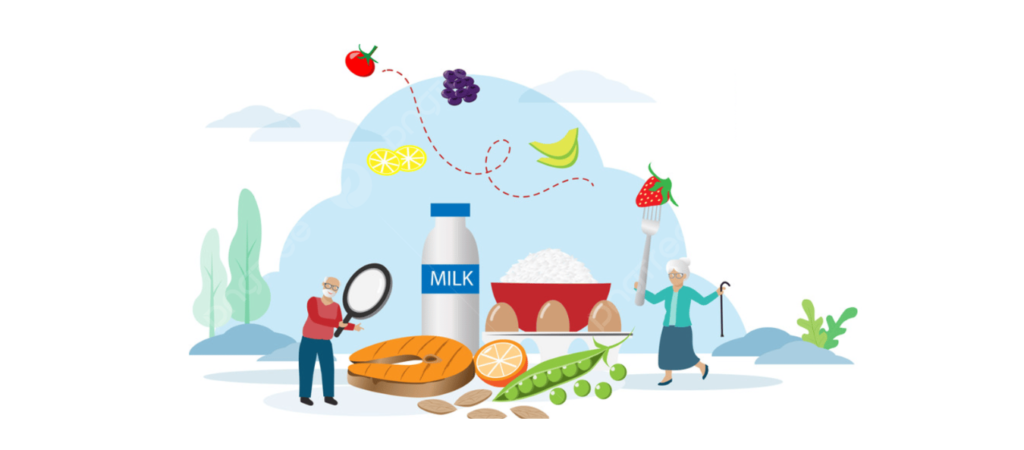As you become older, the foods and drinks that make up a healthy diet for you may be slightly different from when you were younger.Nutrition needs vary with age and gender. When you’re older, the foods and drinks that make up a healthy diet may need to be slightly different from when you were younger. In general, you’ll need less of some foods and more of others.
How you eat as an older person will also vary depending on your gender: older men have different nutritional needs from older women. Healthy eating doesn’t really change that much with age, especially if you already have a good diet. An elderly person simply need to be aware of their own specific nutrition requirements and adjust their food choices so the body gets exactly what it needs for good health in older age.
In a nutshell it is advised to:
- Eat a wide variety of foods from the five food groups: plenty of colourful vegetables, legumes/beans; fruit; grain (cereal) foods, mostly wholegrain and high fibre varieties; lean meats and poultry, fish, eggs, tofu, nuts and seeds; milk, yoghurt, cheese or their alternatives, mostly reduced fat.
- Drink plenty of water – six to eight cups of fluid per day.
- Limit foods high in saturated fat, such as biscuits, cakes, pastries, pies, processed meats, pizza, fried foods, potato chips, crisps and other savoury snacks.
- Replace high fat foods containing mostly saturated fat with foods containing mostly polyunsaturated and monounsaturated fats. Swap butter, cream, cooking margarine, coconut and palm oil with unsaturated fats from oils, spreads, nut butters and pastes, and avocado.
- Limit foods and drinks containing added salt, and don’t add salt to foods in cooking or at the table.
- Limit foods and drinks containing added sugars, such as confectionery, sugar-sweetened soft drinks and cordials, fruit drinks, vitamin waters, energy and sports drinks.
- Limit alcohol
- Keep ‘extras’ or ‘sometimes foods’ to a minimum – they’re not a regular part of a healthy diet. Extras are the high sugar, high fat, high salt foods listed above, such as commercial burgers, pizza, alcohol, lollies, cakes and biscuits, fried foods, and fruit juices and cordials.
- Be physically active. (Aim for at least 30 minutes of moderate intensity physical activity, such as walking, every day.
Extra specific advice for older people includes:
- Maintain healthy weight and muscle strength through physical activity. The benefits of walking for older people]. It’s been shown people over 65 years often have better health if they carry a little extra weight and have a slightly higher body mass index. Talk to your healthcare professional if you need to lose or gain weight.
- If you’re on a budget, simply do your best with your food choices. Plan well, use what’s available, and buy only what you need. Look out for quick and easy healthy recipes for one or two people, and try to eat regularly with family and friends if possible.
- Be careful with your teeth. If nuts, grains and hard fruits and vegetables are difficult to chew, try milled wholegrains, soft cooked and canned fruits and vegetables, and nut pastes and butters.
- Prepare and store food safely. Follow food safety guidelines to avoid food-borne illnesses which can be particularly bad for older people.
- Limit your intake of foods containing saturated fats and trans fats. Remember those ‘extras’ or ‘sometimes foods’ referred to in the guidelines? Keep those to a minimum. Foods like pies, pastries, fried and battered foods, chips, and chocolate are generally high in saturated fat, and may contain dangerous trans fats. Eat these foods very occasionally. Fresh fruit with reduced fat yoghurt is a good dessert option, or cakes and crumbles made with wholegrain options, like oats.
- Talk to your doctor about your personal health needs, particularly about how best to apply the dietary guideline that says to limit saturated fats, added salt, and added sugars (above). Some older people may be at risk of malnutrition from restricting their food intake, and eat too few nutrients and kilojoules for their age.
- Eat plenty of fibre and drink plenty of fluids. Water is essential for hydration, digestion and blood volume, but now you’re older, you may not feel as thirsty as you once did, even when your body needs fluids. Try to drink water about 6–8 cups of fluid a day, and more in warmer weather or when exercising. Water is your best bet for hydration, but tea, coffee, mineral and soda water, and reduced fat milk count too. High fibre foods and plenty of fluids will help to move slow bowels.
- Use less salt. Everyone needs some salt, but too much can increase your risk of high blood pressure and heart disease. Watch your intake of high salt foods, such as cured meats (ham, corned beef, bacon, lunch meats etc.), snack foods (potato chips and savoury pastries etc.), and sauces (soy sauce, for example). Choose reduced salt food when shopping, and flavour your cooking with herbs and spices instead of salt.
- Watch your alcohol intake. Follow Australian guidelines if you drink: no more than two standard drinks on any given day for healthy men and women.
- Get your vitamins and minerals. If you eat less or have digestive issues, you may be deficient in some important vitamins and minerals. Speak to your doctor about your levels, and always choose a variety of foods from the five food groups.
- Fish is your friend. Regularly consuming fish may reduce your risk of heart disease, stroke, dementia, and macular degeneration (a type of vision loss). Eating fish twice a week is wise.
Serving sizes and amounts
When it comes to meals, it’s good to know serving sizes and how much you need for your age. For the five food groups, aim for these serves each day :
Serving sizes for each food group are:
- vegetables: a standard serve is about 75 grams (100–350 kilojoules); for example, ½ cup cooked green or orange vegetables or ½ cup cooked dried or canned beans, peas or lentils
- fruit: a standard serve is 150 grams (350 kilojoules); for example, a medium apple or banana, or two kiwifruits or plums.
- Try to eat whole fruit and not fruit juice
grain foods: a standard serve is 500 kilojoules; for example, one slice of bread or ½ cup cooked porridge. At least two-thirds of choices should be wholegrain varieties - lean meats and poultry, fish, eggs, tofu, nuts and seeds, and legumes/beans: a standard serve is 500–600 kilojoules; for example, 65 grams cooked lean red meats or two large eggs
- milk, yoghurt and cheese or alternatives: a standard serve is 500–600 kilojoules; for example, a cup of milk or ¾ cup yoghurt.
The importance of healthy meals when you’re over 65
Now you’re older, you may find it difficult to get out to buy groceries, or you may feel like your appetite has reduced or disappeared. Health issues may also make it difficult to eat or enjoy foods.
If you can, try to see every meal and snack as a chance to give your body maximum nutrition (like vitamins, minerals and fibre) – and as a social activity you can enjoy with others if possible.
Ask for help with shopping or meal preparation, if you need it, from family and friends, community groups, carers, or your doctor.
Keep the following health matters in mind too.
Healthy bones and teeth
If you’re on bed rest or not exercising much, you may experience muscle loss, which can increase your risk of falls and broken bones. Protein is essential for building, repairing, and maintaining healthy bones and muscles.Try to spread your protein intake across the day so your body has the chance to use it while you’re busy, rather than saving it all until your evening meal when the body doesn’t need it as much. If you’re not very hungry, try to eat the protein part of your meal first.Vitamin D is also essential for healthy bones. The best source is the sun, but you only need a short time in the sunshine each day to get the amount of vitamin D you need.
Arthritis
If you suffer from arthritis, fish oil may help. Eat fish at least twice a week, or talk to your doctor about a supplement.
Healthy bowels
To keep your bowels active, include plenty of fibre in your diet. Wholegrain cereals, wholemeal bread, fruit, dried fruit, dried peas, beans and lentils are all excellent sources. Make sure you drink enough water to prevent constipation. Remember, most older people need 6–8 cups of fluid each day.
Healthy teeth
Have your teeth or dentures checked regularly so you can continue to enjoy a wide variety of foods. See your dentist whenever you are having difficulty with your teeth, gums or dentures.
Remember…
- As you become older, the foods and drinks that make up a healthy diet for you may be slightly different from when you were younger.
- Know serving sizes and amounts for your age.
- If you need help choosing or preparing a healthy diet, chat to a family member, your healthcare professional, carer or an accredited practising dietitian.
- Talk to your doctor about your specific health needs.





